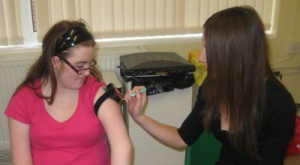by Matthew | Mar 8, 2015 | Notices
A team from the Social Policy Research Unit at the University of York, funded by WellChild, are conducting research into the administration of painful and/or invasive procedures by parents of children with long-term health conditions. This research is running from May 2014 to October 2015 and they are looking for support from parents who may be able to provide their own experiences of this.
They would like to better understand your experiences of undertaking the procedure, being trained to do the procedure, managing your child’s reactions to the procedures, how you think undertaking these procedures affects you, your child and your family, and any support needs arising from this.
If you feel that you could help with the research, further information is available at http://www.york.ac.uk/inst/spru/research/pdf/PEAPIPinf.pdf.
Alternatively, contact Gemma Spiers on 01904 321984, or at gemma.spiers@york.ac.uk.
by Matthew | May 8, 2014 | News
The Children’s Heart Federation (chfed.org.uk) have been campaigning for all babies to receive the Pulse Oximetry test at birth to detect Congenital Heart Disease. This quick, painless and cheap test measures oxygen levels in blood and can detect over 90% of critical heart defects in newborns.
The UK National Screening Committee has now recommended the use of Pulse Oximetry Screening on newborns and has announced today there will be a national pilot. Here are links to the announcement:
http://www.chfed.org.uk/babies-are-set-to-receive-heart-test-to-save-lives/
https://www.gov.uk/government/news/uk-national-screening-committee-recommends-new-test-for-newborn-babies-with-heart-disease
The announcement is receiving some media interest and has appeared on the Telegraph online:
http://www.telegraph.co.uk/health/healthnews/10813377/All-newborns-to-undergo-heart-tests.html
by Anne | Jan 19, 2014 | News
I’ve been to the children’s Cardiac Network meeting this afternoon. Things are changing and the aim is to work more closely together whether you are at Alder Hey, Manchester or at a local hospital to make sure that every child gets appropriate care and support. These changes will take place whatever the new national review decides.
There’s a new website in the pipeline which will show a clear pathway for GPs and parents so everyone knows what will happen to a child with a heart problem in our area.
There are new cardiologists being appointed in Liverpool and Manchester and each job specifies that there will be shared working at the other hospital to help bring the two teams closer together. We don’t yet have a questionnaire ready for parents but it’s top of the list to do.
I asked about the recent TV interest in the surgical teams at Alder Hey. The network monitor and publish the safety figures closely and there are no concerns with the cardiac surgery section. If any parents have any worries just let me know as I can put you in touch with the cardiac team who will take time to talk to you and listen to your concerns.
The Care Quality Commission (CQC) specifically interviewed the cardiac team at Alder Hey and I will let you know their report as soon as it is published.
I also raised your concerns about the new booking system at Alder Hey. This has been particularly hard hitting to the cardiac outpatient system which had been performing well before, but has improved other areas of the hospital where queues had been a problem.
Next meeting in March so let me know if there’s anything you’d like me to feed back.
Anne Flear
Children’s Heart Association
by Matthew | Mar 17, 2013 | News
 The Cardiology Team at Alder Hey are very excited by the arrival of a few bugs in clinic. No, don’t worry, not those kind of bugs. These are buzzing plastic lady-bugs!! These friendly little creatures are designed to help take the pain out of needles. They work by using natural pain relief in the
The Cardiology Team at Alder Hey are very excited by the arrival of a few bugs in clinic. No, don’t worry, not those kind of bugs. These are buzzing plastic lady-bugs!! These friendly little creatures are designed to help take the pain out of needles. They work by using natural pain relief in the
form of vibration to confuse your nerves and distraction to take your focus away from the needle. Vibration and distraction together help dull or eliminate sharp pain like needles.
Other departments in Alder Hey had tried them out and given how well they were received by patients, The Children’s Heart Association offered to fund three for the cardiology team. So if you are in clinic or on the ward and need a blood test, cannula, finger prick or injection and would like to give Buzzy a try, be sure to ask a member of staff. Be sure to let us know what you think of it.
 Jessica Sellars (aged 14) was kind enough to let us take a photograph of her trying Buzzy. She had to have two injections, the first one was a while ago before we got our Ladybugs. When she had her second injection she tried “Buzzy” and said “it felt really cold on her arm but the second injection didn’t hurt as much as the first one”.
Jessica Sellars (aged 14) was kind enough to let us take a photograph of her trying Buzzy. She had to have two injections, the first one was a while ago before we got our Ladybugs. When she had her second injection she tried “Buzzy” and said “it felt really cold on her arm but the second injection didn’t hurt as much as the first one”.
If you would like to watch some videos of Buzzy being demonstrated, learn more about it or would like to buy your own, visit the website at www.buzzy4shots.com.
by Matthew | Mar 17, 2013 | Notices
Please see below a statement from Sir Neil McKay following today’s judgment in the High Court.
http://www.specialisedservices.nhs.uk/news/view/139
Thursday, 7th March 2013
Sir Neil McKay CB, Chair of the Joint Committee of Primary Care Trusts said:
“I am very disappointed with the Court’s decision. The pressing need to reform children’s heart services is long overdue and experts have cautioned that further delay in achieving the necessary change would be a major set back in improving outcomes for children with heart disease.
“The judgment focuses on a single matter of process, but the case for the reconfiguration of children’s heart surgical services remains strong. There is a rare consensus on the need for change right across the board – NHS staff, medical royal colleges, professional associations and national charities all support the case for fewer larger surgical centres, new national quality standards and stronger networks of care.
“The consultation – which we undertook with an honest and open mind – was the largest carried out by the NHS and respondents were staunch in their support of the need for change. There is nothing in the Court’s judgment that supports the Claimant’s accusations that the consultation was a “rubber stamping” exercise. The judge in fact found that:
“This was a comprehensive consultation, lasting a matter of months and prompting 77,000 responses. Thought and care was given to the consultation process both as to its content and implementation. When considered necessary, independent work or advice was commissioned; professional groupings provided advice when requested. Those responsible for, and involved in, the setting up and implementation of this process aimed to provide one which was informed, detailed and transparent”.
“This case has focused on a narrow technical point relating to whether 450 sub-scores generated by the Kennedy panel should have been available to respondents to consultation. The Joint Committee of PCTs itself chose not to examine the sub-scores as it did not believe that it had either the expertise or the evidence to second-guess the panel’s conclusions. For the same reason the sub-scores would not have assisted respondents to consultation. Respondents were provided swathes of documentary evidence to consider during consultation, including a detailed 155 page narrative report prepared by the panel.
“The panel members agreed their scores after a rigorous on site assessment of the surgical units. I believe that most respondents – of whom there were around 77,000 – would have been very surprised had the JCPCT chosen to substitute its own scores for those of the independent panel, which is in essence the foundation of the Claimant’s case.
“We do not yet know what the Court will decide in terms of next steps. We are making representations to the Court that it should not quash the decision in its entirety as the Claimant seeks. Once we have the Court’s judgment on this point we will strongly consider the possibility of appeal.
“The Claimant wishes for the NHS to abandon its plans for the reconfiguration of children’s heart services against the express wishes of the vast majority of respondents to consultation. I never forget that the purpose of our work is saving lives and improving quality of life for children, and on behalf of the NHS I want to reassure families, patients and clinicians that we remain as determined as ever to reconfigure services for children with congenital heart disease in the interests of better outcomes and a more safe and sustainable service for children and their families.”
(more…)

 The Cardiology Team at Alder Hey are very excited by the arrival of a few bugs in clinic. No, don’t worry, not those kind of bugs. These are buzzing plastic lady-bugs!! These friendly little creatures are designed to help take the pain out of needles. They work by using natural pain relief in the
The Cardiology Team at Alder Hey are very excited by the arrival of a few bugs in clinic. No, don’t worry, not those kind of bugs. These are buzzing plastic lady-bugs!! These friendly little creatures are designed to help take the pain out of needles. They work by using natural pain relief in the Jessica Sellars (aged 14) was kind enough to let us take a photograph of her trying Buzzy. She had to have two injections, the first one was a while ago before we got our Ladybugs. When she had her second injection she tried “Buzzy” and said “it felt really cold on her arm but the second injection didn’t hurt as much as the first one”.
Jessica Sellars (aged 14) was kind enough to let us take a photograph of her trying Buzzy. She had to have two injections, the first one was a while ago before we got our Ladybugs. When she had her second injection she tried “Buzzy” and said “it felt really cold on her arm but the second injection didn’t hurt as much as the first one”.